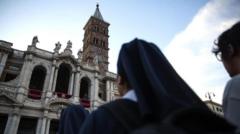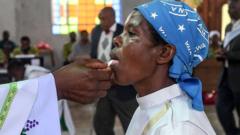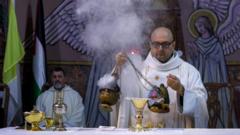With the Vatican's College of Cardinals preparing to meet in the Sistine Chapel, speculation arises about who might succeed Pope Francis as the head of the Roman Catholic Church, a position that influences over 1.4 billion Catholics worldwide. Unlike previous conclaves, this one is poised to be markedly unpredictable, with the majority of cardinals having been appointed by Francis himself. Significantly, this will be a conclave that does not have a European majority, casting a wider net on potential candidates.
Who Will Succeed Pope Francis? Unraveling the Colorful Candidates in the Race for Papacy

Who Will Succeed Pope Francis? Unraveling the Colorful Candidates in the Race for Papacy
As the Vatican prepares for its next papal conclave, a diverse and potentially transformative lineup of candidates emerges, bringing fresh perspectives to an unpredictable selection process.
Among the frontrunners is Cardinal Pietro Parolin of Italy, who has served as the Vatican's secretary of state, often viewed as a diplomatic figure, balancing the need for tradition with a global perspective. Cardinal Luis Antonio Gokim Tagle from the Philippines is also under scrutiny, recognized for his grassroots connections, and dubbed "the Asian Francis." As strongly as he champions social causes, Tagle could appeal to diverse factions within the church.
In Africa, Cardinal Fridolin Ambongo Besungu from the Democratic Republic of Congo brings a conservative viewpoint and a focus on cultural identity. Cardinal Peter Kodwo Appiah Turkson from Ghana also enters the mix as a potential historical figure as the first African pope, despite expressing reluctance for the role.
Other notable names include the Hungarian Cardinal Peter Erdo, a compromise candidate with a deep understanding of church dynamics, and Cardinal Angelo Scola from Italy, whose past involvement in papal discussions keeps him in the spotlight.
Potential American candidates like Cardinal Robert Prevost and international figures including German Cardinal Reinhard Marx and Canadian Cardinal Marc Ouellet demonstrate a growing global influence in the church. Meanwhile, progressive figures like Cardinal Michael Czerny from Canada could sway voters seeking continuity with Francis's reformist legacy.
In this diverse array of candidates, each with unique backgrounds and ideologies, the path to papacy remains uncertain, reflecting a church that may be ready to embrace significant change in its leadership. As the conclave approaches, the world watches closely to see who will guide the future of the Roman Catholic Church.
In Africa, Cardinal Fridolin Ambongo Besungu from the Democratic Republic of Congo brings a conservative viewpoint and a focus on cultural identity. Cardinal Peter Kodwo Appiah Turkson from Ghana also enters the mix as a potential historical figure as the first African pope, despite expressing reluctance for the role.
Other notable names include the Hungarian Cardinal Peter Erdo, a compromise candidate with a deep understanding of church dynamics, and Cardinal Angelo Scola from Italy, whose past involvement in papal discussions keeps him in the spotlight.
Potential American candidates like Cardinal Robert Prevost and international figures including German Cardinal Reinhard Marx and Canadian Cardinal Marc Ouellet demonstrate a growing global influence in the church. Meanwhile, progressive figures like Cardinal Michael Czerny from Canada could sway voters seeking continuity with Francis's reformist legacy.
In this diverse array of candidates, each with unique backgrounds and ideologies, the path to papacy remains uncertain, reflecting a church that may be ready to embrace significant change in its leadership. As the conclave approaches, the world watches closely to see who will guide the future of the Roman Catholic Church.





















